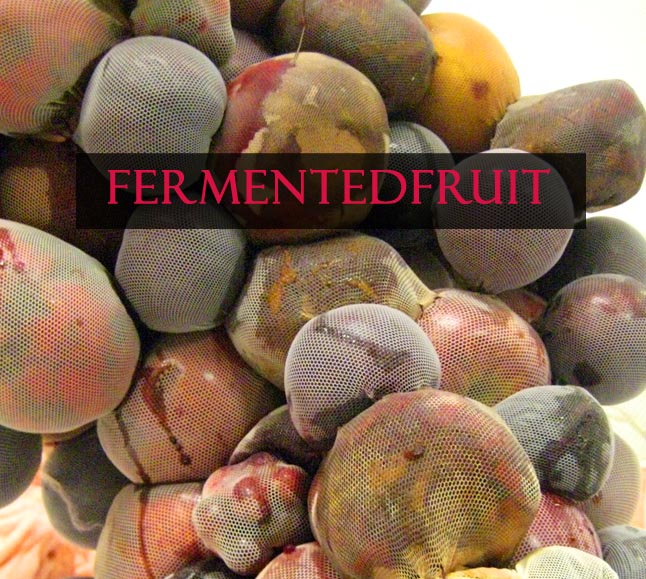Why people ignore the ugly things in life but within this they are missing the beauty that lies under the rotten fruit!!!!!!
Alexander McQueen, via twitter post
Since the fears of the past were connected with the functions of the body, they reappear through the body. For me, sculpture is the body. My body is my sculpture.
Louise Bourgeois
We cannot avoid dying nor can we avoid bursting through our barriers, and they are one in the same.
How sweet it is to remain in the grip of the desire to burst out without going the whole way, without taking the final step!
Humanity is transgressed, profaned and besmirched. The greater the beauty, the more it is befouled.
The body is a thing, vile, slavish, and servile, just like a stone or a piece of wood
The final aim of erotism is fusion, all barriers gone, but its first stirrings are characterized by the presence of a desirable object.
Georges Bataille, Erotism: Death and Sensuality
A wound with blood and pus, or the sickly, acrid smell of sweat, of decay, does not signify death. In the presence of signified death—a flat encephalograph, for instance—I would understand, react, or accept. No, as in true theater, without makeup or masks, refuse and corpses show me what I permanently thrust aside in order to live. These body fluids, this defilement, this shit are what life withstands, hardly and with difficulty, on the part of death. There, I am at the border of my condition as living being. My body extricates itself, as being alive, from that border. Such wastes drop so that I might live, until from loss to loss, nothing remains in me and my entire body falls beyond the limit—cadere, cadaver. If dung signifies the other side of the border, the place where I am not and which hermits me to be, the corpse, the most sickening of wastes, is a border that has encroached upon everything. It is no longer I who expel, “I” is expelled.
Julia Kristeva
The leakage of talk. My mind is dribbling out through my mouth.
My will is more flabby than it’s ever been before. Let this be the dip before the upswing.
I have diarrhea of the mouth and constipation of the typewriter.
Susan Sontag
To perceive Camp in objects and persons is to understand Being-as-Playing-a-Role.
It is the farthest extension, in sensibility, of the metaphor of life as theater.
Camp is the attempt to do something extraordinary.
But extraordinary in the sense, often, of being special, glamorous.
What Camp taste responds to is "instant character".
Character is understood as a state of continual incandescence - a person being one, very intense thing.
Camp introduces a new standard: artifice as an ideal, theatricality.
For Camp art is often decorative art,
emphasizing texture, sensuous surface, and style at the expense of content.
It is the love of the exaggerated, the "off," of things-being-what-they-are-not.
Camp is art that proposes itself seriously, but cannot be taken altogether seriously because it is "too much."
It's not a love of the old as such. It's simply that
the process of aging or deterioration provides the necessary detachment -- or arouses a necessary sympathy.
The lover of Camp, appreciates vulgarity.
Susan Sontag, Notes on Camp
The action of the alter is primal; it involves the body. The alter becomes the place where the sack is cut open-the human sack is cut open-the body sack or the animal sack, the sack meaning skin. We search for what can’t be gotten at the interior of the body, cutting open the body to peer inside. In my work there’s a kind of theater of that, and by theater I mean I the use of representation. The object becomes the body-it doesn’t need to be me, or even another human. I operate in a kind of theater. I use objects to represent things, to represent thoughts and feelings. The objects don’t necessarily have to relate to themselves, they can be a symbol for something else. Ketchup can represent blood, it’s not necessary that it be blood. I became more interested in mimicking, appropriation, fiction, representation and questioning meaning.
Paul McCarthy, interview with Kristine Stiles
Skin holds a peculiar place within figurative speech. As perhaps no other part of the human body, it serves both as a representation of the whole and as that which conceals it. On the one hand, skin is a stand-in for “person”, “spirit”, “body”, or “life”; that is to say, it is a synecdoche for the human being. Yet at the same time, and this is what makes it so singular, skin functions as the other of the self, by representing its cover, its prison or mask, its medium of communication with the world.
Claudia Benthien
"We all know what darkness is ....we carry it within usAnish Kapoor

